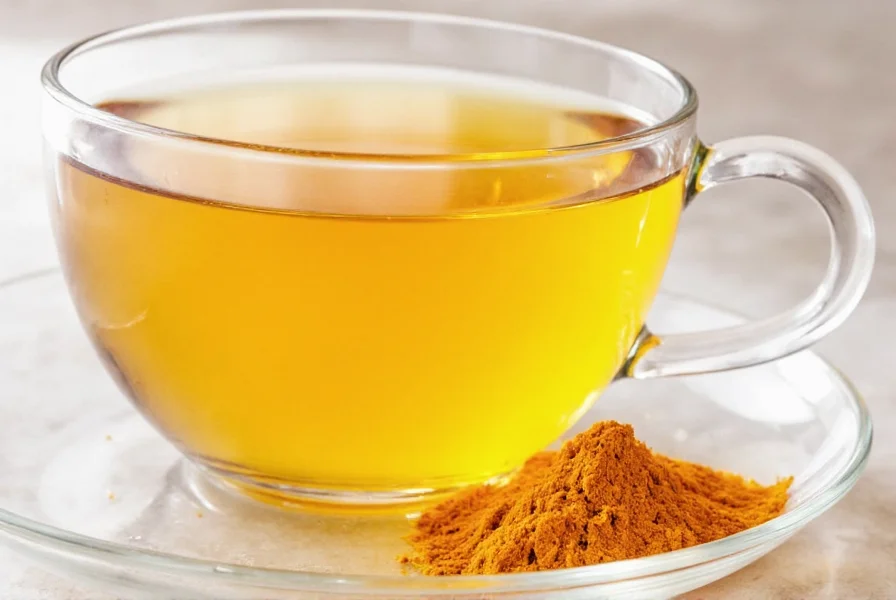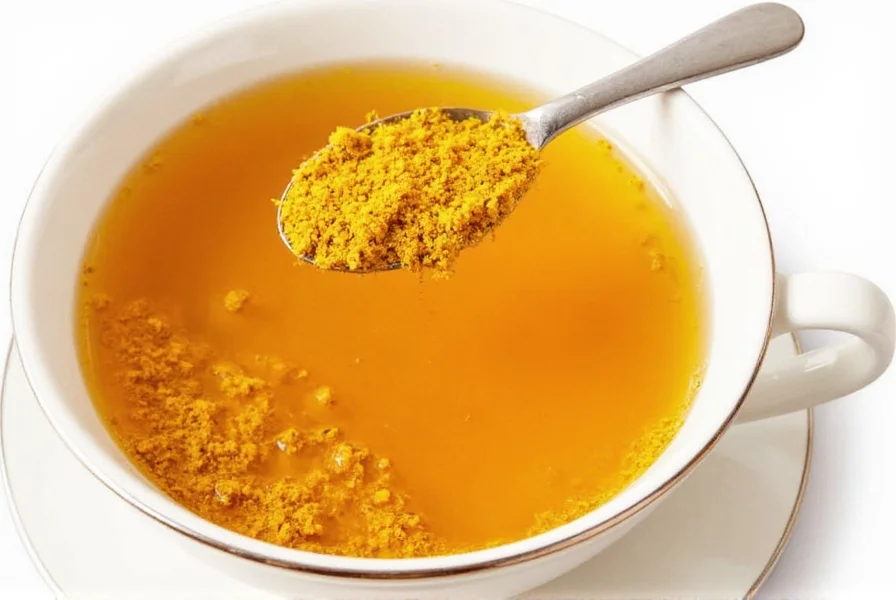For centuries, traditional medicine systems across Asia have utilized turmeric for its healing properties. Modern science is now validating many of these traditional uses, particularly regarding inflammation management and antioxidant protection. Turmeric tea represents one of the most accessible ways to incorporate this powerful spice into daily wellness routines.
Understanding Turmeric and Its Active Compound
Turmeric (Curcuma longa) is a bright yellow-orange spice belonging to the ginger family. The primary bioactive compound responsible for turmeric's health benefits is curcumin, which constitutes about 2-8% of most turmeric preparations. Curcumin possesses potent anti-inflammatory and antioxidant properties that have been the subject of extensive scientific research.
When consumed as tea, turmeric's compounds become water-soluble, making them more readily available for absorption. However, curcumin has low bioavailability on its own. This is why traditional preparations often include black pepper, which contains piperine—a compound that can increase curcumin absorption by up to 2,000%.

Evidence-Based Health Benefits of Turmeric Tea
Multiple clinical studies have investigated the potential health benefits of turmeric and curcumin. While research continues, several benefits have substantial scientific backing:
Powerful Anti-Inflammatory Effects
Chronic inflammation is linked to numerous health conditions including heart disease, cancer, and Alzheimer's. Curcumin in turmeric tea demonstrates significant anti-inflammatory effects by inhibiting multiple molecules involved in inflammation pathways. A 2017 review published in Food Science & Nutrition concluded that curcumin's anti-inflammatory properties are comparable to some anti-inflammatory drugs, but without the side effects.
Antioxidant Protection
Turmeric tea provides robust antioxidant protection by neutralizing free radicals and stimulating the body's own antioxidant enzymes. This dual action helps combat oxidative stress, which contributes to aging and many diseases. The Journal of the American Chemical Society identified curcumin as one of the most potent natural antioxidants studied.
Joint Health Support
Several clinical trials have shown turmeric's effectiveness in managing osteoarthritis symptoms. A 2016 study in the Journal of Medicinal Food found that participants who consumed curcumin experienced significant improvements in pain and physical function compared to placebo. The anti-inflammatory properties make turmeric tea particularly beneficial for those with inflammatory joint conditions.
Cardiovascular Health
Research suggests turmeric tea may improve endothelial function—the lining of blood vessels—which plays a crucial role in regulating blood pressure and clotting. A 2017 study in Nutrition Journal reported that curcumin supplementation improved endothelial function similarly to exercise in postmenopausal women.
| Health Benefit | Scientific Support Level | Recommended Daily Intake |
|---|---|---|
| Anti-inflammatory effects | Strong clinical evidence | 500-2,000 mg curcumin |
| Antioxidant protection | Extensive laboratory evidence | 500-1,000 mg curcumin |
| Joint pain relief | Moderate clinical evidence | 500-1,500 mg curcumin |
| Cardiovascular support | Emerging clinical evidence | 500-1,000 mg curcumin |
Limitations of Current Research
While the potential benefits of turmeric tea are promising, it's important to understand the limitations of current research:
- Many studies use concentrated curcumin supplements rather than tea preparations
- Long-term effects of regular turmeric tea consumption require more research
- Individual responses vary based on genetics, health status, and preparation methods
- Most studies have been conducted on supplements with enhanced bioavailability, not traditional tea
A 2020 review in Nutrients noted that while curcumin shows therapeutic potential, more human trials with standardized preparations are needed to establish definitive health claims for turmeric tea specifically.
Preparing Effective Turmeric Tea
To maximize the health benefits of turmeric tea, preparation matters. Here's a simple, evidence-based recipe:
- Boil 2 cups of water
- Add 1-2 teaspoons of freshly grated turmeric root or ½ teaspoon turmeric powder
- Add a pinch of black pepper (for enhanced absorption)
- Simmer for 10-15 minutes
- Strain and add optional ingredients: lemon, honey, or ginger
For optimal absorption, consume turmeric tea with a source of healthy fat like coconut milk or a small handful of nuts. The fat helps with the absorption of curcumin's fat-soluble compounds.

Safety Considerations and Potential Side Effects
Turmeric tea is generally safe for most people when consumed in culinary amounts. However, some considerations include:
- High doses may cause digestive upset in sensitive individuals
- May interact with blood-thinning medications
- Potentially problematic for people with gallbladder issues
- May lower blood sugar levels, requiring monitoring for diabetics
The European Food Safety Authority considers up to 3 mg of curcumin per kilogram of body weight per day as safe for long-term consumption. For a 150-pound person, this translates to approximately 200 mg of curcumin daily.
Integrating Turmeric Tea Into Your Wellness Routine
For those seeking natural approaches to support overall health, turmeric tea can be a valuable addition when approached realistically. It's not a cure-all, but rather a complementary component of a healthy lifestyle that includes balanced nutrition, regular exercise, and adequate sleep.
Consistency matters more than quantity—daily consumption of moderate amounts appears more beneficial than occasional large doses. Many health practitioners recommend incorporating turmeric tea into morning or evening routines for optimal absorption and habit formation.
Frequently Asked Questions
How much turmeric tea should I drink daily for health benefits?
For general wellness, 1-2 cups of properly prepared turmeric tea daily provides sufficient curcumin to potentially deliver health benefits. Each cup should contain approximately 1-2 teaspoons of fresh turmeric or ½ teaspoon of turmeric powder, plus a pinch of black pepper to enhance absorption. Consuming more than 3 cups daily isn't necessarily better and may cause digestive discomfort in some individuals.
When is the best time to drink turmeric tea?
The optimal time depends on your goals. For anti-inflammatory benefits, many health practitioners recommend morning consumption to help manage daily inflammation. For better sleep and overnight recovery, evening consumption may be beneficial. To maximize absorption, drink turmeric tea with or after a meal containing healthy fats. Avoid drinking it on an empty stomach if you have digestive sensitivity.
Can turmeric tea help with weight loss?
While turmeric tea isn't a weight loss solution, research suggests it may support metabolic health. A 2015 study in the European Review for Medical and Pharmacological Sciences found that curcumin supplementation helped reduce body fat and improve metabolic markers. Turmeric tea may complement weight management efforts by reducing inflammation that can interfere with metabolism, but it should be part of a comprehensive approach including diet and exercise.
How long does it take to experience benefits from turmeric tea?
Most people notice subtle effects after 4-8 weeks of consistent daily consumption. Anti-inflammatory benefits may become apparent as reduced joint discomfort, while antioxidant effects build gradually over time. Research suggests curcumin reaches optimal blood concentration after about 3-4 weeks of regular intake. Individual results vary based on health status, preparation method, and overall lifestyle factors.
Is store-bought turmeric tea as effective as homemade?
Most commercial turmeric teas contain significantly less active curcumin than homemade versions. A 2021 analysis found that store-bought turmeric tea bags typically contain only 10-25mg of curcumin per serving, while a properly prepared homemade cup can deliver 50-100mg. For therapeutic benefits, homemade tea with fresh turmeric root, black pepper, and healthy fat is substantially more effective than most commercial products.











 浙公网安备
33010002000092号
浙公网安备
33010002000092号 浙B2-20120091-4
浙B2-20120091-4